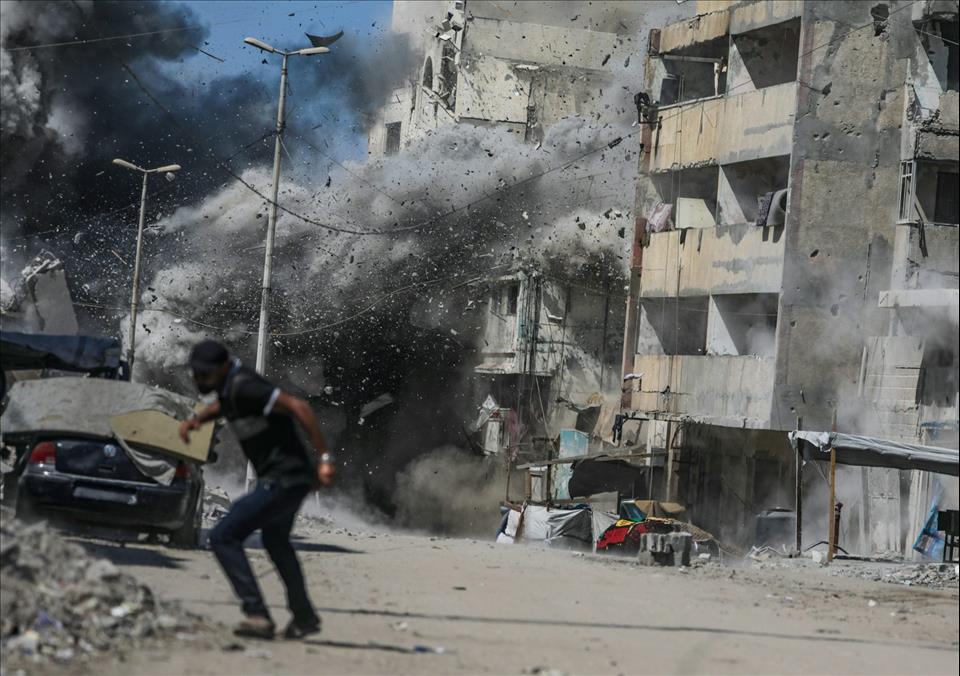
Why Are The ICJ And ICC Cases On Israel And Gaza Taking So Long?
This report followed two years of investigation, but it's not the only investigation underway.
There are two international courts with current proceedings related to the Israel-Palestine conflict.
The first, a case before the International Court of Justice (ICJ), was brought against Israel by South Africa in late 2023.
In the second, International Criminal Court (ICC) prosecutors have been investigating potential crimes allegedly committed by anyone, whether Israeli or Palestinian, on the territory of Palestine since March 2021 – even before Hamas' October 7 2023 attack.
So, if the UN-backed commission of inquiry could put together their report in two years, why are the cases in the ICJ and ICC taking so long? And where are these proceedings up to now?
The International Court of Justice caseA case before the ICJ often takes many years.
This is because the cases often involve multiple stages, including:
-
provisional measures (the ICJ version of an injunction, which is an interim court order to do or stop doing something)
preliminary objections (where a state may object to the ICJ's jurisdiction in the case) the merits case (where the court decides whether or not a country has violated international law).
Each stage involves the parties to the case making written submissions and undertaking oral proceedings. The court also makes decisions at each stage. States must be afforded due process throughout the proceedings.
Another reason for the lengthy period of cases is that states often ask for extensions for their written submissions.
In the South Africa v Israel case (which focused on the question of whether Israel is in breach of its obligation to prevent and punish genocide as per the Genocide Convention), Israel requested and was granted a six-month extension to file their written submission, which is now not due until January 2026.
This means we may not expect a hearing on the merits of the case until possibly even 2027.
A Palestinian mother flees with her children following an Israeli airstrike during an October Israeli military operation in Gaza. EPA/MOHAMMED SABER The International Criminal Court case
Cases before the ICC, which are brought against individuals, not states, are not like ordinary criminal cases in a domestic court.
These cases relate to not just one crime, but many crimes. Sometimes, perpetrators are charged with multiple offences.
As an example, Dominic Ongwen – a high-ranking member of the Lord's Resistance Army operating in Uganda – was convicted of 61 counts of war crimes and crimes against humanity , each of which generally involved multiple victims.
This means the ICC has to collect and present a huge amount of evidence. This can include documents, photographs, and victim and witness testimony. It can take a long time, even years, to collect all this evidence.
Once the case goes to court, it can take many months of hearings, as all the evidence is presented.
The case may also be delayed if either the prosecution or defence asks for an extension at any point in the proceedings.
All of these elements are important to ensure any trial before the ICC is fair and carried out with due process.
In the case relating to Palestine, the ICC prosecutor moved quite quickly with investigations following Hamas' October 7 2023 attack.
Arrest warrants were issued for Israeli Prime Minister Benjamin Netanyahu and then-Defence Minister Yoav Gallant in November 2024, with charges of crimes against humanity (including murder and persecution) and the war crime of starvation.
At the same time, arrest warrants were also issued for several Hamas leaders for war crimes and crimes against humanity relating to the October 7 atrocities. Only one of those leaders, Mohammed Diab Ibrahim Al-Masri (Deif), remains likely alive, however.
The ICC now stands ready, willing and able to start a prosecution case against Netanyahu, Gallant or Hamas leaders such as Deif. All it needs is to have them in custody in The Hague.
However, the ICC has no police force. It relies on member states to the ICC to arrest and surrender wanted fugitives.
Interpol“Red Notices” may be issued for people wanted by the ICC . Recently, for instance, the Philippines arrested and surrendered its former president, Rodrigo Duterte, to the ICC, where he is now on trial for crimes against humanity .
Unfortunately, states seem less willing to arrest and surrender the Israeli head of state. This creates a challenge for the ICC in its ability to proceed with prosecutions, but also attracts criticism of double standards of states .
Netanyahu has visited Hungary, an ICC member state, but was not arrested . Hungary has since announced it intends to withdraw from the ICC.
Upholding international lawSo, it's clear the ICC and the ICJ already have legal proceedings well underway relating to crimes in Gaza. These international courts are ready to hear legal arguments and make decisions on state responsibility or individual criminal liability for crimes committed in Palestine or against Palestinians.
What we need, however, is commitment from states to uphold international law.
Countries must comply with their international law obligations and cooperate with international courts, including by arresting and surrendering wanted fugitives to the International Criminal Court.
This is what will help speed the slow-turning wheels of justice.

Legal Disclaimer:
MENAFN provides the
information “as is” without warranty of any kind. We do not accept
any responsibility or liability for the accuracy, content, images,
videos, licenses, completeness, legality, or reliability of the information
contained in this article. If you have any complaints or copyright
issues related to this article, kindly contact the provider above.


















Comments
No comment